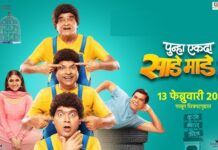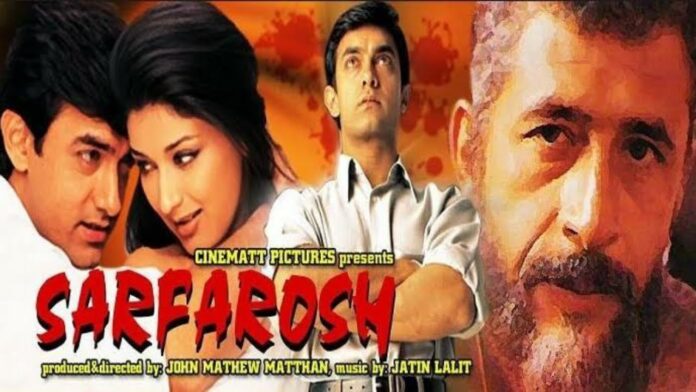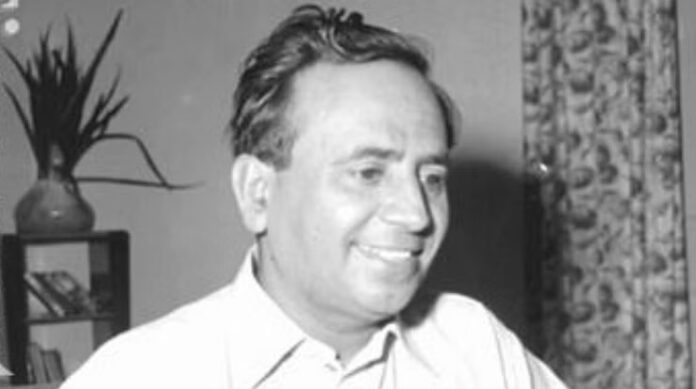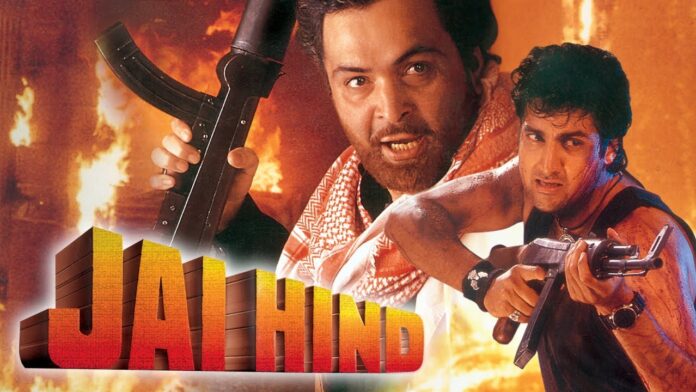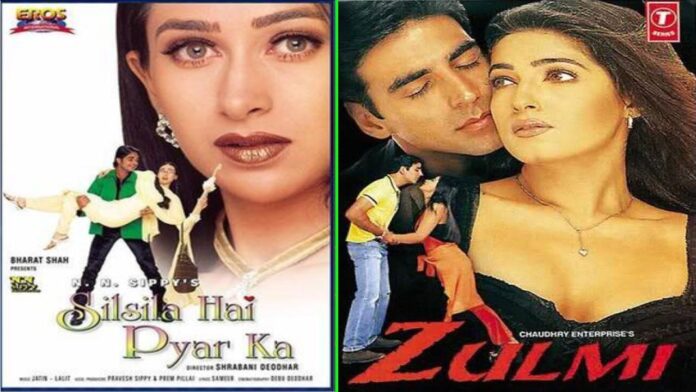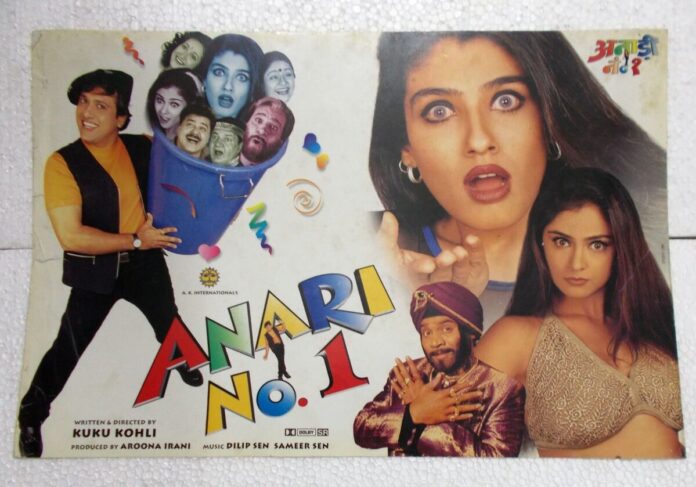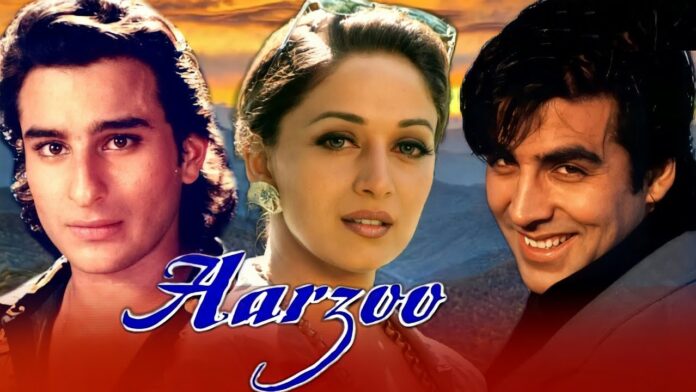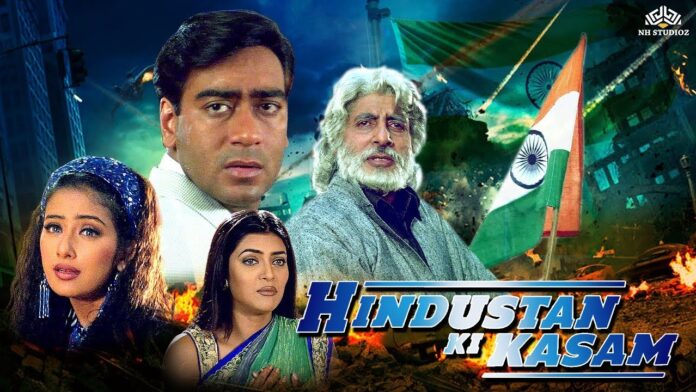PRODUCTION NEWS
‘Hindustan Ki Kasam’ Shooting Complete
The entire shooting of Devgan Films’ Hindustan Ki Kasam is complete following the conclusion of the last 10-day shooting spell in Los Angeles. The background score for the film will be recorded from March 15 at Sunny Super Sounds. Starring Amitabh Bachchan, Ajay Devgan, Manisha Koirala, Sushmita Sen, Prem Chopra, Shakti Kapoor, Gulshan Grover, Farida Jalal, Navin Nischol, Shahbaaz Khan, Pramod Moutho, Kashmira Shah, Johny Lever, Salim, Navin Bawa, Goga Kapoor, Ghanshyam, Brij Gopal, Pinky Chinoy, Noopur, Kader Khan and Mallika, it is produced and directed by Veeru Devgan. Dialogues: Tanveer Khan. Music: Sukhwinder Singh. Lyrics: Anand Bakshi. Cinematography: Ishwar Bidri. Action: Jai Singh. Choreography: Raju Khan. Art: Bijon Dasgupta. Editor: Suresh Chaturvedi. The film is presented by Bharat Shah.
LATEST POSITION
Examinations are affecting collections all over the country.
Lal Baadshah dropped a lot from 4th day onwards. Is very poor in Bombay and Delhi but quite good in U.P.. 1st week Bombay 37,40,310 (57.28%) from 14 cinemas (7 on F.H.); Ahmedabad 7,19,384 from 5 cinemas (1 unrecd.), Adipur 1,08,225 (66.69%), Patan 1,42,084; Pune 7,67,703 from 6 cinemas (1 in matinee); Delhi 26,09,032 (38.95%) from 12 cinemas (2 on F.H.); Kanpur 4,08,782 from 2 cinemas (1 on F.H.); Lucknow 2,73,512, Varanasi 1,98,836, Allahabad (38 shows) 3,11,000, Bareilly 1,76,066, Hardwar 55,000; Rohtak 30,000; Calcutta 32,71,062 from 27 cinemas; Nagpur 4,34,892 from 4 cinemas, Jabalpur 1,58,436, Amravati 1,58,641, Akola 1,51,208, Wardha 70,974, Bilaspur 1,63,073 from 2 cinemas; Indore 3,40,574 from 3 cinemas (3 on F.H.), Bhopal 1,35,470 (1 on F.H.); Jaipur 11,02,552 from 5 cinemas, Bikaner 2,27,650 from 2 cinemas; Hyderabad (gross) 7,24,578 from 3 cinemas (1 in noon), share 21,72,000 (including 14 fixed hire cinemas and Aurangabad).
Laawaris is extremely poor at most of the places. 1st week Bombay 20,45,408 (46.80%) from 10 cinemas (7 on F.H.); Ahmedabad 1,70,014 from 3 cinemas (3 unrecd.); Pune 5,81,468 from 5 cinemas (1 in matinee), Solapur 1,02,240 (1 unrecd.); Delhi 14,92,807 (30.66%) from 9 cinemas; Kanpur 1,00,709, Lucknow 1,60,619, Varanasi 1,24,830, Allahabad (38 shows) 1,35,000, Bareilly 47,328; Calcutta 9,45,452 from 22 cinemas; Nagpur 1,76,473 from 4 cinemas, Jabalpur 75,293, Amravati 1,21,520, Akola 43,404, Gondia (gross) 82,762, Chandrapur 1,21,134; Jaipur 1,19,730; released this week in C.I. and Hyderabad.
Kaun is good only in Bombay and a few other centres. 2nd week Bombay 18,02,931 (81.80%) from 4 cinemas (4 on F.H.); Ahmedabad 2,12,647 from 3 cinemas; Pune 2,42,759, Solapur 63,052 from 2 cinemas (1 in matinee); Delhi 12,53,896 from 5 cinemas; Kanpur 49,456, Lucknow 62,554, Varanasi 41,132, Allahabad 40,100; Calcutta (27 shows) 1,47,322; Nagpur 1,59,125; Indore 28,691, Bhopal 39,282; Hyderabad (gross) 2,54,169; Davangere 87,318, 1st week Bellary (Telugu) 56,218.
Kachche Dhaage will fetch commission in some circuits and overflow in some. 3rd week Bombay 14,61,084 (55.95%) from 7 cinemas (6 on F.H.); Ahmedabad 3,05,473 from 4 cinemas (1 unrecd.), 1st week Kadi 1,08,518, 3rd week Jamnagar 46,775; Pune 4,88,895 from 5 cinemas (1 in matinee), Solapur 74,818, 1st Barsi 50,711; 2nd week Bijapur 80,000; 3rd Delhi 17,55,021 from 7 cinemas (1 on F.H.); Kanpur 1,79,000 (1 unrecd.), Lucknow 3,08,427, Varanasi 1,60,727, Allahabad 1,37,380, Bareilly (6 days) 1,03,417, Hardwar 31,552; Rohtak 18,129; Calcutta 4,89,130 from 6 cinemas; Nagpur 1,69,589 from 2 cinemas, Jabalpur 1,70,461, Amravati (6 days) 75,499, Akola 62,970, total 3,73,934, share 2,66,320, Dhule 57,250, Durg (6 days) 47,363, 1st week Bilaspur 64,277; 3rd week Bhopal (6 days) 79,645; Jaipur 4,73,312, Bikaner (gross) 94,626; Hyderabad (gross) 3,05,585; Mangalore 93,649, 1st week Shimoga 87,842.
Daag The Fire 4th week Bombay 3,18,793 (35.24%) from 3 cinemas (2 on F.H.); 1st week Padra 1,31,229; 4th Pune 1,27,790 from 2 cinemas, Solapur 48,830, 1st week Barsi 37,622; 4th week Delhi 90,880 (2 on F.H.); Kanpur 2,29,484 from 2 cinemas, Lucknow 2,64,285, Varanasi 1,48,246, Allahabad 96,000, Bareilly 72,938, Hardwar 37,000; Calcutta 1,18,518; Nagpur 64,423 from 2 cinemas, Jabalpur 62,055, total 4,54,363, Amravati 93,680, Akola 75,431, total 4,74,522, share 3,50,583; Indore 80,000, Bhopal 68,484; Jaipur 1,48,831, Bikaner 35,853; Hyderabad (gross) 2,84,542 from 2 cinemas.
Hum Aapke Dil Mein Rehte Hain 7th week Bombay 16,35,348 (49.95%) from 8 cinemas (3 on F.H.); Ahmedabad 2,44,729 from 2 cinemas (1 unrecd.), Baroda 80,611; Pune 3,84,027 from 3 cinemas (1 in matinee), Solapur (14 shows) 96,090; Delhi 2,16,389 from 2 cinemas; Kanpur 1,42,348 from 2 cinemas, Lucknow 1,84,217, Varanasi 1,02,101, Allahabad 40,100, Bareilly 18,827; Calcutta 1,47,322; Nagpur 1,10,161 from 2 cinemas, Jabalpur 36,900, total 5,97,719, Amravati 73,275, Akola 34,050, total 6,25,200, Dhule 32,325, total 4,77,021; Hyderabad (gross) 2,54,382.
‘MOTHER 98’ TAX-FREE IN U.P.
Producer-director Saawan Kumar’s Mother 98 has been granted exemption from payment of entertainment tax by the Uttar Pradesh government. The film has already been granted a similar exemption in Delhi.
‘GODMOTHER’ RELEASE PERMITTED
Santokben Jadeja, on whose life story Godmother is alleged to be based, has appealed to the Gujarat high court against an order passed by the Rajkot city civil judge, allowing the release of Gramco Films’ Godmother, with cuts in two scenes. Santokben Jadeja, a former MLA of Gujarat assembly and a self-styled lady don of Saurashtra, had earlier moved the city civil court with a petition, seeking a stay on the release of the film which, according to her, was based on her real-life story. She had stated in her petition that the character based on her (played by Shabana Azmi in the film) is shown smoking and consuming alcohol, which would damage her reputation beyond repair within her community. Gramco’s advocates counter-argued that the similarity, if any, between their film’s character and Santokben Jadeja was only coincidental. Upon hearing the arguments for both the parties, the city civil court judge viewed the film on 10th March. Subsequently, he passed an order allowing the release of Godmother, provided the producer suitably changed two scenes depicting Shabana’s character consuming alcohol and smoking.
STANLEY KUBRICK DEAD
Hollywood director Stanley Kubrick, well-known for his 2001: A Space Odyssey and Dr. Strangelove, died in London on 7th March. He was 70 and leaves behind his wife and three daughters.
Paying tributes to him, Warner Bros. chairman and co-chief executive officers Robert A. Daly and Terry Semel said, “We are deeply saddened by the loss of Stanley Kubrick, a towering figure in the world of films and a deeply loved and respected member of the Warner family for nearly three decades. Stanley’s unique vision and protean abilities as filmmaker have fascinated and inspired audiences and colleagues for almost half a century….. We are fortunate to have screened the just completed Eyes Wide Shut, Stanley’s final picture, last week.”
‘TVS SA RE GA MA’ SET COLLAPSES, 30 INJURED
Nearly 30 persons were trapped when a makeshift set of the popular TV programme, TVS Sa Re Ga Ma (Zee TV), collapsed at the Taj Mahal in Agra on 11th March. The incident, which occurred at about 10 p.m., resulted in injuries to a number of fans who were present on the set. None of the cast was present on the set when it collapsed.
AUDIO PIRATE NABBED
The MIDC, Andheri (Bombay) police raided the premises of one Ashok Kumar Baijnath Rai and seized over 7,000 fake audio cassettes (including over 2,000 duplicate cassettes of T-Series) and other materials and duplicating equipments, totally valued at more than Rs. 3,40,000 on 11th March.
JATIN, LALIT ARRESTED
Music directors Jatin and Lalit, accused of assaulting the lobby manager of Hotel Centaur, Juhu, Bombay, in 1989, were on March 9, 1999 remanded to judicial custody till March 23, by metropolitan magistrate of Bandra (Bombay) court, B.A. Shelar. They were sent to Arthur Road jail. While Jatin was arrested on 9th March, Lalit surrendered before the court on 10th. Both were declared absconding by the court last month after they failed to attend hearings.
On August 13, 1989, the Santa Cruz police had registered a case against four persons — Jatin, Lalit, Vinod Bhat and Salma Bihari — for assaulting Kishore Naik, the lobby manager of Centaur Hotel. All the four were arrested and released on bail the next day. The police later filed the chargesheet and the court framed charges against the accused on December 23, 1993. As the accused failed to attend most of the hearings in the case, and a non-bailable warrant, issued in November ’98, could not be executed as the accused had shifted their residences, the court declared the accused as absconding. Bhat and Bihari are yet to be traced.
‘JAIHIND’ TAX-FREE IN MAHARASHTRA, U.P., GUJARAT
Manoj Kumar’s Jaihind has been granted entertainment tax exemption for a year in Maharashtra. It has also been granted tax exemption for two months in Uttar Pradesh and for six months in Gujarat.
UNI TENDERS APOLOGY TO MUKESH KHANNA IN DELHI HC
As in his popular TV serial, SHAKTIMAAN, Mukesh Khanna proved the hero in real life too when one of the premier news agencies of the country, United News of India (UNI), tendered an apology to the actor-producer in court. Mukesh Khanna had filed a defamation suit against UNI for flashing false news about children immolating themselves after seeing his serial, in the hope that the serial hero, Shaktimaan, would come to their rescue. He had also filed a suit against Doordarshan which decided to take his serial off air (intimated vide DD’s letter dated 24-2-’99) despite a contract for 104 episodes. According to Mukesh Khanna, DD’s action to take his serial off air was based on the news items flashed by UNI.
The counsel for UNI, in a hearing of DD and defamation suits in Delhi high court in the courtroom of Justice M.K. Sharma on 11th March, admitted that the news reports about SHAKTIMAAN having inspired children to have set themselves afire, flashed by it (UNI), were incorrect and a bonafide mistake on its part for which UNI was tendering an apology and expressing regret.
In view of the admission of inaccurate reporting by UNI and in view of its apology for the same, which were recorded by the Delhi high court in suit no. 484/1999, additional solicitor general C.S. Vaidyanathan, appearing for Doordarshan, told the court that DD would reconsider its decision to take SHAKTIMAAN off air and, therefore, sought a short adjournment.
The matter will now come up for further hearing on 17th March.
Arun Jaitley, with Rajat Sethi, appeared for Mukesh Khanna. T.L. Garg appeared for UNI.
JAWAHARLAL BAFNA MISSING
Producer Jawaharlal Bafna, whose Aaag Hi Aag has been released this week, left his office on Friday (12th March) morning and is since untraceable. His family filed a complaint with the Oshiwara police station but his whereabouts was not known till late Friday night.
Bafna’s son, Deven, told Information on Friday night at 12.15, “Daddy was feeling very low and dejected since the last 2-3 days. He was unhappy with the behaviour of some of his distributors who took deliveries at reduced prices, saying that he (Jawaharlal Bafna) was in plus, when the fact is that my daddy was in heavy deficit even after all the deliveries were effected.” The C.P. Berar distributor did not take delivery.
Jawaharlal Bafna, instead of returning home, slept in his office on the night of 11th March (Thursday) after effecting all the deliveries. His Delhi-U.P. distributor was also with him that night. On Friday, he left his office without informing anybody. A hand-written note, found in his drawer, mentioned that he had been honest in his dealings but honesty and sincerity did not pay in life. The note also said that he was not fit for this world, that he was leaving his place and that nobody should try to search for him. A line was also mentioned for Mithun Chakraborty to the effect that he should not loot people. Mithun had allegedly agreed to work in Aaag Hi Aag at a price lower than his market price because Bafna had suffered losses in his earlier film, Dadagiri, which also starred Mithun. But, according to Deven Bafna, “Mithun refused to complete his dubbing unless he was paid more money although the contracted amount had already been paid to him.”
CCCA FOUNDER-PRESIDENT H.N.S. RAO DEAD
Industry Loses Honest, Sincere Leader
C.P.C.I. Trade Mourns Subbarao’s Death
C.P. Berar distributor and founder-president of the Central Circuit Cine Association, H.N. Subba Rao, breathed his last at 7.30 p.m. on 9th March at his Bhusawal residence after a brief illness. He was 89. The news of his demise spread like wild fire in the C.P.C.I. Rajasthan trade. The Amravati and Indore trades held condolence meetings on 10th. All the business establishments and the offices of CCCA at Bhusawal, Indore, Amravati and Jaipur remained closed on 10th in his honour.
Born on 25th August, 1910 in Mysore, H.N.S. Rao’s first brush with the film industry was when he joined Baburao Pai’s Famous Pictures in Bombay after matriculating and completing a course in typewriting and shorthand in 1927. Although he joined as a stenographer, his quest for learning saw him working in all the departments. He was deputed to the concern’s Delhi office for a few months and in 1932, he was elevated to the post of branch manager of the Calcutta office. He was called to Bombay again and asked to set up a new distribution office, Kolhapur Talkie Distributors. He also briefly looked after the production work when Famous Pictures branched out into film production. But since distribution was where Subbarao’s (as he was called) heart was, he was shifted back to film distribution where he continued till 1937.
On 1st January, 1938, Famous Pictures opened its Bhusawal office, and Subbarao shifted base there. He later became a partner in the concern and when the other partners retired, he took over the firm. His honesty and sincerity, which he was known for when he was employed at Famous Pictures, continued to be his greatest assets till he breathed his last. The tradition of sincerity and honesty is being carried on in the same vein by his sons, H.S. Pandurang Rao and Anant Rao.
H.N.S. Rao distributed over 200 films, many of which were jubilee hits. He was the regular distributor of films produced by Mehboob Khan, Raj Kapoor, K. Asif, Prabhat Film Company, O.P. Ralhan and Atmaram.
H.N.S. Rao was the founder-member of the first executive committee of the CCCA and was also the member of the committee which drafted the constitution of the FFI. In the CCCA, his opinions at annual general meetings and otherwise were always greatly valued. For his valuable contribution to the film trade of C.P.C.I. Rajasthan, in particular, he was honoured at the hands of then president of India, P. Venkataraman, on the eve of the 75th anniversary of the film industry, in Madras.
He also founded a number of educational, social, cultural and charitable organisations including the society which runs an arts, science and commerce college in Bhusawal. The computer lab, which was funded by him, at the college is named after him.
The cine trade of Indore and the staff of the administrative office of the CCCA in Indore on 10th March condoled the death of H.N.S. Rao, at Film Bhawan. The condolence meeting was chaired by the honorary treasurer of the CCCA, Ramesh Sureka, who, paying tributes to the departed soul, said that the sad demise had caused an irreparable loss to the CCCA and the film fraternity. G.S. Gupta referred to him as the Gandhi of the CCCA. Joharilal Jhanjharia recalled his association with H.N.S. Rao since the time the CCCA was founded and his heroic efforts for the growth of the film industry that had made him a living legend. M.L. Jain recounted that Subbarao was a man of principles and a no-nonsense leader. Govind Acharya gratefully acknowledged that he had learnt a lot from H.N.S. Rao. Uttam Nahar and Jitendra Jain appreciated the late leader’s humane qualities, open-mindedness and zest for the betterment of the film fraternity. J.P. Chowksey also paid glowing tributes to Subbarao.
The meeting adopted the condolence resolution moved by Ramesh Sureka, a copy of which was later sent to the bereaved family. The meeting ended after a 2-minute silence was observed. All the film offices of Indore as well as Film Bhawan remained closed on 10th.
A meeting of the Amravati cine trade was held on 10th under the chairmanship of CCCA vice president Vijay Rathi to pay homage to H.N.S. Rao. Glowing tributes were paid to the visionary and leader. His death was mourned and it was mentioned that the industry had lost a sincere and devoted worker. Two minutes’ silence was observed. A copy of the condolence resolution passed at the meeting was sent to H.S.P. Rao.
RAM UDAR JHA NO MORE
Bihar distributor and exhibitor Ram Udar Jha expired at Muzaffarpur on 4th March. He was 70 years old. He had also produced Hindi and Bhojpuri films.
Jha owned Jawahar Picture Palace, Muzaffarpur. A condolence meeting to mourn his demise will be held at Muzaffarpur on 15th March.
ANNOUNCEMENT & LAUNCHING
Bobby Deol, Ranee In Guddu Dhanoa’s ‘Bichhoo’
Guddu Dhanoa’s Bichhoo, being presented by Narinder Dhanoa and starring Bobby Deol, Ranee Mukerji and Raj Babbar, was launched on March 10 with a song recording at Sunny Super Sounds. The song, penned by Sameer and tuned by Anand Raaj Anand, was rendered by Jaspinder Narula and Harry Anand. Being made under the banner of Bhagwan Chitra Mandir, it will go before the camera next month with regular schedules every month. The film’s executive producer is Veena Sood.
YOU ASKED IT
Does Karisma Kapoor play a double role in Silsila Hai Pyar Ka?
– No, she doesn’t, although the promotional trailer of the film, on air on satellite channels, gives that impression.
What has happened to the unofficial ban on the release of dubbed Hollywood films in Bombay?
– The ‘ban’ continues. There’s been no settlement of the issue as yet. The foreign companies and the IMPDA, TOA, CEAI etc. have not yet met after the initial joint meeting.
Which heroine will Kajol’s marriage benefit the most?
– Karisma Kapoor, of course! Although Kajol will continue acting, she will definitely do fewer films.
MIX MASALA
CAR THEFTS
Anupam Kher’s car was stolen earlier this week, together with his cell-phone while he went to pray at a Hanuman temple at Tardeo, Bombay. The temple used to be frequented by Kher during his struggling days. Perhaps, this was God’s way of telling him that, may be, he doesn’t visit Him as often as he used to!
Incidentally, producer-secretary Rakesh Nath’s (Rikku’s) Tata Safari was also stolen from Andheri (D.N. Nagar) some days ago.
A SLANGING MATCH
Close on the heels of the news about the cricket match between Bombay distributors and exhibitors to be held today (13th March) comes another news that the match has now been cancelled. Producer Vashu Bhagnani was to present Biwi No. 1 trophies to the best batsman, best bowler, best fielder and the best team. He was to also display banners of Biwi No. 1 at the ground. This, it appears, became the bone of contention for a few distributors who raised a hue and cry over it. Their argument was that if everyone was required to pay Rs. 500 for participating in the match, why should the organisers single out Vashu for preferential treatment? The organisers, who have since dropped the idea of holding the match, argue that the sum of Rs. 500 was being charged only to keep the free-loaders out from the dinner and the cocktails after the match. The actual bill was to be footed by Vashu and once the match was over, the sum was to have been refunded to every participant, they conclude. It is difficult to ascertain what is true and in such a scenario, as always, a great deal of bickering, bitching and backbiting is being indulged in by both sides. Shall we call it Bitching No. 1, Bickering No. 1 and Backbiting No. 1?
DO YOU KNOW?
* At Ashok cinema, Patna, it was double celebration time. SOLDIER celebrated 100 days at the cinema in regular shows and FIRE celebrated 100 days in morning shows.
* Ashok cinema, Patna, completed its golden jubilee on 3rd March, 1999. The cinema was opened on 3rd March, 1949 by the first Indian governor of Bihar, M.S. Anney. He had then described the cinema as the best of Bihar. Since then, the cinema has been known as the pride of the capital (city).
* Music director and lyricist Anand Raaj Anand’s brother, Harry, made his debut in playback singing on 10th March. Harry Anand lent his voice to a song of Guddu Dhanoa’s BICHHOO alongwith Jaspinder Narula.
3-E
Education-Entertainment-Enlightenment
A News, Out Of Sur, Out Of Taal
The film industry woke up with a jolt last Sunday (7th March). Two persons (a male and a female), identifying themselves as Mukta Arts’ employees, phoned nearly 25 people from the industry, between 4 and 4.30 a.m. and informed them that Subhash Ghai had expired a couple of hours before. While some were told that he expired due to a heart attack at 2.30 a.m., others were informed that he was murdered. Obviously, the news spread like wild fire throughout the industry and within the next few hours, Ghai’s residence (it was a Sunday) was inundated with phone calls to verify the news because many of them believed the calls to be a hoax. Of course, Ghai himself answered many of the telephone calls. In fact, after attending the calls, he rushed straight to the shooting of his forthcoming Taal. Evidently, some miscreants had played a prank by spreading rumours of Subhash Ghai’s death. It was only by late afternoon that day that all in the industry learnt of the falsity of the news, and his mobile phone and the phones at Subhash Ghai’s residence stopped ringing.
While Subhash Ghai must have been greatly inconvenienced by the whole incident, he may, perhaps, take solace in the Hindu belief that several years are added to the life-span of a person in the event of rumours being spread about his death.
‘Biwi No. 1’ Right In Midst Of Cricket Fever
The period between 14th May and 20th June this year is taboo as far as new releases are concerned. With the World Cup cricket matches scheduled to be held at that time, producers and distributors are wary of releasing any big film in opposition. But Vashu Bhagnani is doing exactly what the rest of the trade may term as committing harakiri. He is moving full steam ahead to release his Biwi No. 1 on 28th May. And he has a strong logic for his plans. Says he, “By 28th May, the public will have had a good dose of cricket and will be yearning for a change. Since no major film is scheduled for release in that period, Biwi No. 1 will get the benefit of this desire for a change.” God willing!
Akshay And Action
The new promotional trailers of International Khiladi seem to have done the trick. Full of action and breathtaking stunts, the trailers have excited the exhibitors of U.P. in a big way. For, they are paying fancy terms to the film’s distributor. After all, like the audience, even the exhibitors are waiting to see Akshay Kumar in what he is best — action and stunts!
Heroine Changed
Karisma Kapoor has been replaced by Preity Zinta in Sajid Nadiadwala’s Har Dil Jo Pyar Karega. Although grapevine has it that the reason for Karisma walking out of the film was her fallout with choreographer Farah Khan (who will choreograph the songs of Sajid’s film), producer Sajid insists, it is purely due to date problems. That Karisma hurt her foot recently is common knowledge. Because of the foot injury, the talented actress could not shoot for several days, which resulted in postponements of her shootings. This, according to Sajid, was affecting his film’s shooting schedules from April onwards and he, therefore, opted for Preity. Coming back to Karisma and Farah Khan, the two were reportedly involved in an unpleasant encounter of the sad kind at a recent party. Propounders of the Karisma-Farah enmity theory as being the cause for the walkout by Karisma from Har Dil Jo Pyar Karega reveal that the actress made it clear to Sajid that she would not work with Farah Khan. The producer, they say, refused to replace Farah. Of course, Sajid refutes the entire story and maintains that the change in heroine was necessitated only because of date problems. Anyway, the film now stars Salman Khan, Ranee Mukerji and Preity Zinta.
Manoj Kumar’s Success Story: How It Began
The incident mentioned below was conveyed to us by Manoj Kumar earlier this week when the topic of discussion was Akshaye Khanna and his films. Like many in the industry, Manoj Kumar too felt that it was very sad that the films of a talented boy like Akshaye were flopping one after another. Expressing sympathy thus, Manoj Kumar related an incident of the time when he had joined the industry as an artiste. He too had a line of flops — six, to be precise, one after the other. Like Manoj Kumar today is feeling sad for Akshaye, (late) Om Prakash at that time felt sorry for Manoj. In one meeting with Manoj Kumar, the veteran actor told him, “You are so good-looking and you also act well, it’s a pity that your films are not doing well.” Saying this, Om Prakash advised Manoj to visit Haji Malang, a pilgrim place near Bombay. Manoj Kumar heeded Om Prakash’s advice and went to pray at Haji Malang. He recalled the long uphill walk to the dargah where he prayed for success. When he was climbing downhill, he heard a voice from behind him, which said, “Jaa, ikattees tareekh ko milenge.” He turned around and saw and old man dressed in clean white clothes and with a flowing white beard. Although he was standing where many beggars were stationed, Manoj Kumar recalled that he didn’t look like a fakir. When the unsuccessful actor asked him what he meant to say, the man in white replied, “You will taste success from 31st.” The premiere of Manoj Kumar starrer Hariyali Aur Raasta was held on 31st of that month and, sure enough, Manoj had the first taste of success with that film and how! Hariyali Aur Raasta proved a silver jubilee hit and from there began the success story of Manoj Kumar. The successful actor went to Haji Malang on many occasions after that “but,” he says ruefully, “I never saw that man in white ever again.”
Maybe, Akshaye can take a leaf out of this and visit Haji Malang.
Jai State Governments
At a time when entertainment tax is being considered one of the biggest evils in the industry, it comes as a perfect gift for Manoj Kumar that not one or two but a total of seven state governments have exempted his Jaihind from entertainment tax. The Maharashtra government has been the last to grant the film exemption but it has given the relief for one full year. The other states in which the patriotic film is tax-free are Gujarat, Delhi, U.P., M.P., Rajasthan and Haryana. This now should really excite the distributors. For, few films create such history even before they are released, right?!
‘Khiladi’ Ek, Films Anek
It is well-known by now that Akshay Kumar is the reigning hero as far as Khiladi films are concerned. He has already starred in Khiladi, Main Khiladi Tu Anari, Sabse Bada Khiladi, Khiladiyon Ka Khiladi and Mr. & Mrs. Khiladi while his International Khiladi is due for release on 26th March. What is, perhaps, less known is the fact that the word ‘Khiladi’ has been quite popular with producers for years now — much before Akshay came on the scene. The first of the ‘Khiladi’ films was Khiladi itself, made way back in 1945. Later, four more films were made with the same title, one each in 1950, 1961, 1968 and, of course, the Akshay-starrer in 1992! Then, there was Ek Khilari Bawan Pattey made in 1972, Do Khiladi (1976), Khel Khilari Ka (1977), Shatranj Ke Khiladi (1977), Paanch Khiladi (1986) and Khatron Ke Khiladi (1988). Moreover, the Hindi dubbed versions of four films were also titled Khel Khiladi Ka, Khiladi No. 1, Kanoon Ka Khiladi and Ek Anari Do Khiladi. All in all, a whopping 20 films have the word Khiladi in their titles. So, shall we say, “Well ‘play’ed, Khiladi!”?
Filmi Threats
A producer-director of ‘B’ grade film reportedly threatened the CBFC officials recently that he would have their whole office burned down if his film was not passed without cuts! The film in question was actualy made in the ’80s. Now, nearly a decade-and-a-half later, the man has applied for a certificate for the same film which includes all the portions originally ordered by the censors to be cut. Obviously, this producer-director thought that he could terrify the examining committee and also the censor chairperson. But, of course, nobody took him seriously and chose to simply dub the threats as part of his madness.
Naam — The Title
The fad of adding English words to Hindi film titles is catching on fast these days. Daag The Fire has already been released and Manoj Kumar’s Jaihind The Pride has been retitled just Jaihind. Even then, several under-production films have English words attached to their titles. Take a look at the following: Woh – The Killers, Khooni Ilaaka – The Prohibited Area, Kaaran – The Reason, Jadh – The Root Cause, Tabaahi – The Destroyer, Dal – The Gang and Tapish – The Burning Desire. Now, what do you say to this Paagalpan – The Madness?!?
Dream Merchant
Buraa Na Mano, Holi NAHIN Hai!
I received a call from BBC, London earlier this week. The caller asked me if I could speak about Bollywood’s Holi bashes this year, on their programme the next evening. I told them, there hadn’t been any major Holi celebration parties this year but having said so, I dreamt about Holi in Bollywood. I dreamt that….
….Aamir Khan had all the plans to have a Holi party. He had even booked Rajkamal Studio for it and was making sure, the studio floor would accommodate the invitees. He had taken details of the floor size and painstakingly calculated how many people it could comfortably hold. Since several of the invitees would be under the influence of bhaang or some alcoholic drink, he was making an allowance for more body space. He had asked his office staff to give him the exact details of how many among the invitees were fond of drinking, what they preferred to drink, whether they would come single or with their spouses etc. etc. The calculations and statistics were taking so long to compile that the earliest that perfectionist Aamir’s Holi bash could take place would be sometime around Diwali. And so the plan was abandoned.
Govinda almost had a Holi party. Except that his invitations reached exactly the way he reaches on producers’ sets — late! Everyone I contacted lamented, they received Govinda’s invitation for the 9 o’clock shift — sorry, party — at 2 p.m. on the Holi day.
Rajkumar Santoshi had decided on a unique Holi bash — only for senior citizens. The invitations had been sent to actors, actresses and technicians in the industry, who are more than 70 years of age. Insiders revealed, young Dev Anand refused to accept the invitation. Insiders also revealed, Urmila Matondkar was the only non-senior citizen lucky to have been invited for the Holi party and the Rangeeli heroine had agreed to make a brief 5-minute appearance. But this Holi party was cancelled at the eleventh hour as Santoshi was not santosh with his own concept of ‘senior citizens Holi’. In keeping with his spirit of re-shooting, he told his staff to re-arrange a new Holi bash, so what if it was delayed — this was in keeping with the delayed status of his films. I am told that the Holi bash, which ultimately never took place, was to have been presented by Bharat Shah, whatever that meant.
Akshaye Khanna said, he had no reason to celebrate any festival, Holi or Diwali. And anyway, after the debacle of Doli Saja Ke Rakhna, the young actor is allergic to anything that even rhymes with ‘Doli’. “Please yaar, Holi se bachaa ke rakhna,” he pleaded.
Shah Rukh Khan, on the other hand, sent out invitations for a Holi gathering on — hold your breath! — top of a train. The invitees would be required to smear colours on each other’s faces while they danced atop a moving train. Shah Rukh had even booked the Rajdhani Express for the express purpose of the Holi get-together. But, but…. man proposes and Indian Railways disposes! The party got cancelled because the Rajdhani Express of 2nd March arrived in Bombay from Delhi in the evening instead of morning, as was scheduled.
Manoj Kumar decided to have Holi celebrations at his bungalow but said, he would restrict the colours to be used to just three — saffron, white and green. Even as everybody was appreciating the patriotic flavour of his Holi party, Manoj Kumar had to issue a cancellation notice because he had to rush to Gujarat with a print of his Jaihind for its tax exemption!
Aishwarya Rai declined to play Holi with colours. Instead, she said, she would burn Holika by consigning every piece of wood in her house to the flames. At least then, she thought, critics would stop calling her wooden. Touch wood!
Saif Ali Khan almost coaxed Salman Khan into hosting a Holi get-together. But the super-successful Khan told Saif, “Holi ko maar goli, chal shikaar khelte hain.” Saif hung up the telephone like a frightened kid and never stepped out of his house — neither to play Holi nor to shoot goli!
Mithun Chakraborty issued invitation cards for his Holi party. But since he insisted, everyone come to Ooty, nobody obliged. Well, almost nobody. T.L.V. Prasad and Jackie Shroff did go to Ooty but were disappointed to see Mithun playing Holi in four shifts. They soon shifted base to Bombay again, with a red face — not reddened by gulaal but due to embarrassment for having flown to Ooty and returned without playing with colours.
Vikram Bhatt scoffed at the very idea of playing Holi. I learnt later that the poor guy, fed on Hollywood films, simply didn’t know what Holi was and what it signified. When Aamir explained to him on telephone that one burns wood a day before Holi, Vikram couldn’t believe his ears. “Burn wood on Holi? You mean Holiwood in Bollywood?” Aamir disconnected the line.
Sridevi didn’t play Holi simply because she didn’t know that 2nd March was Holi day. She confessed to Rajkumar Santoshi’s wife the following day, “Aie aie yo, Boney-ji told me on 1st that it was Holi day on 2nd, but I thought, he meant to say that he won’t go to office. So I made plans to go on a picnic with him to a crowded place like Juhu Beach to feel like a commoner. After all, what do you do on a holiday?”
– Komal Nahta



